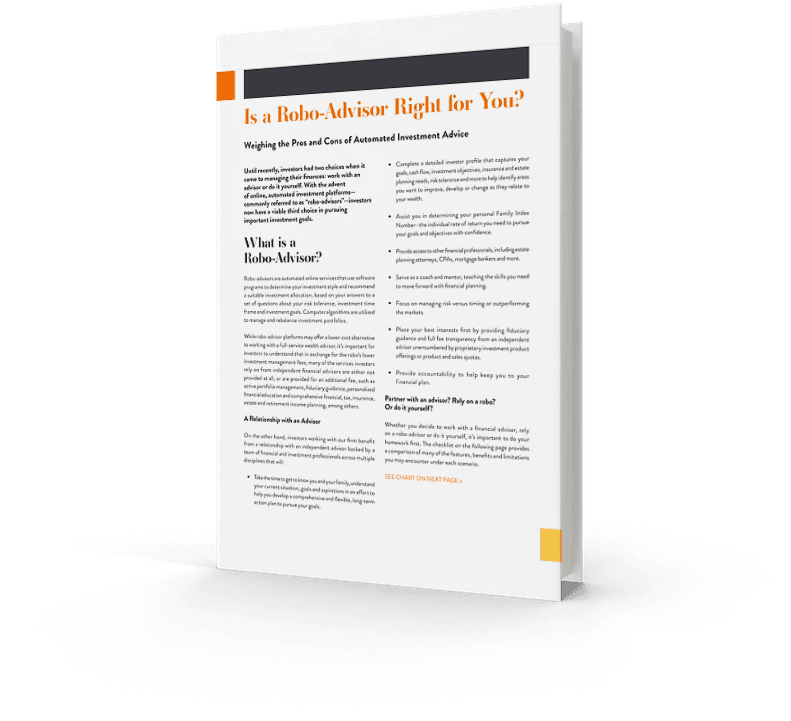Estate Planning
Have you considered your legacy?
Your legacy is much more than your assets. It’s your personal values, the memories that carry on and your entire belief system. Your estate plan should be a reflection of the legacy you want to leave.


Risk Management
Our advisors will help you align your estate plan with your financial plan, which includes beneficiary reviews, creating a will or trust, regular updates and reviews, and more. We’ll help you address commonly overlooked items that can create significant risks and complications for your loved ones.
We’ll Help You Consider:
Medical Power of Attorney
Durable Power of Attorney
Living Will
Special Needs Trusts
Second Marriages
Blended Families
Nontraditional Families
Creditor Protection
Dementia
Medical Power of Attorney
Durable Power of Attorney
Living Will
Special Needs Trusts
Second Marriages
Blended Families
Nontraditional Families
Creditor Protection
Dementia
Legacy Planning
Your advisor is here to help you understand how your assets will be distributed under your current estate plan and existing tax laws. We work with our in-house team of estate planning specialists, attorneys, CPAs, and any of your outside professionals to formalize your wishes. We want to help minimize your estate’s administrative burden and maximize the value distributed to your loved ones and the organizations you cherish.
Why you should select a corporate trustee:

Ability & Legal Knowledge

Trust Management by Professionals

Continued Investment Management

Experienced Professionals
When Should I Start Worrying About Putting Together My Estate Plan?
Answered by Beth Schanou, JD, Senior Wealth Planner
Answered by Beth Schanou, JD, Senior Wealth Planner
Who wants to spend an afternoon thinking about their mortality? No one, which is why more than half of Americans don’t even have a will.
The foundation of your estate plan is a Last Will and Testament. Without a will, you are leaving the disposition of your assets and the guardianship of your minor children to a court. In Nebraska, for example, if someone were married at the time of death and died without a will, the spouse does not receive all of the assets if the person who died has children.
Even from this one example, you can see that creating and structuring a will is complex. Let’s look at a few of the basics to help you start this important conversation.
What is a will?
A will is a legal document that directs what happens to your stuff, directs who will handle your stuff (your executor) and directs what happens to your children by naming a guardian to take care of them.
Where can I get a will?
Check to see if your employer offers any kind of legal benefits. Some employers offer their stakeholders help in getting a will created. There are also online will-creation services. However, the big pitfall of the “DIY” will is that while a lawyer checks that the will complies with legal standards no one is verifying its correctness.
Hire an estate planning attorney
For most people creating a will, hiring an estate planning attorney makes the most sense. The attorney verifies accuracy and can work with your financial advisor to confirm your will coordinates with your financial accounts, your savings plan and legacy wishes. Plus, the attorney can point out things that you may have never thought of – there are a lot of angles here, and a lot you can do to make sure your loved ones are well cared for.
It’s important to find an attorney who specializes in estate planning. State laws are constantly changing and you want to work with someone who is in that area of law on a daily basis so you can ensure you have a plan that complies. Ask friends and co-workers if they know a good estate planning attorney if you don’t know anyone. You can also look up your local estate planning council or bar association to see if they can give you some names to help with creating a will.
Next, you’ll want to connect with several estate planning attorneys and determine the best fit. Ask about the process and what fees you will likely face and ask about what you need to do to prepare for your next meeting. You’ll likely want someone who is younger than you so he or she can continue to help you with your planning needs throughout your lifetime.
Your estate planning attorney might have a questionnaire to complete prior to your first visit. There are important questions that the attorney will want to ask and get answers to. Usually, an hour will set the attorney up for success in getting what he or she needs to draft a plan that accurately outlines your wishes and correctly complies with your state’s laws.
Click here to download our complimentary resource: Estate Planning Simplified
What About a Trust?
Of course, creating a will is absolutely necessary regardless of whether you add a trust to your list of estate planning documents. But a common question is “do I need a trust?” Again, not surprisingly, the answer is, “it depends.”
A trust can be an important step toward fulfilling your family’s financial goals. There are specific advantages to having a trust: continuity of asset management, privacy and tax savings are among a few.
What is a Revocable Living Trust?
A living or revocable trust provides for the organization and management of your assets during your lifetime, including any periods of disability. In addition, having your assets in a trust during your lifetime will prevent your estate from having to pass through a court-supervised process if you only have a will (or no will) at the time of your death.
Creating a trust also provides an incredible amount of flexibility after your death. For example, you could have your trust divide up your assets after you are no longer living and create new trusts for your children to protect them against creditors and divorce.
The Drawbacks to Trusts
Trusts do have a downside. Compared with wills, creating trusts comes with additional work of funding the trust and making sure all assets are in the trust. Your attorney can discuss the options for creating and funding a trust with you. Regardless, you’ll still need a simple will, as a back-up, even if you do some trust planning.
Prioritize Your Estate Plan
Whether you decide to create a trust, prioritize getting your will and powers of attorney completed. Creating a will and other estate planning documents isn’t a Herculean task. The bonus of getting it done is that you’ll sleep better at night knowing you have a plan to take care of loved ones when the day comes and you are no longer able to.
Your financial advisor can help you begin this conversation in a way that makes sense for you and your family. Knowing not just your holdings, but your style and values will help you shape a legacy that expresses your care for the people and causes you love. Let’s talk!
This is designed to provide accurate and authoritative information on the subjects covered. It is not, however, intended to provide specific legal, tax, or other professional advice. For specific professional assistance, the services of an appropriate professional should be sought. Cetera Advisor Networks LLC does not provide legal or tax advice.


Millennials
For Millennials, managing life and finances comes with challenges, especially those like balancing college debt with home ownership and having important goals like saving for retirement. Download this free guide for tips on how Millennials can get started on the path to the confident financial future that they seek.
Carson Wealth Management is a Trust Representative Office of National Advisors Trust Company (NATC) and National Advisors Trust of South Dakota, Inc. (NATSD) doing business as Carson Private Trust.
